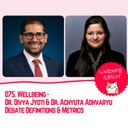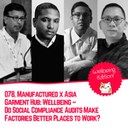
Factory Training Materials - Basic modules

Factory Training Materials - Basic modules

The Climate Action Training includes 5 thematic modules that can be completed independently (self-paced) or in a tutor guided format. Participants of the Climate Action Training will learn how to minimize climate risks and reduce greenhouse gas emissions in your business operations. In 11 modules for self-paced or tutor-guided training participants of e-REMC Chemical Management will learn how to improve and implement chemical managment systems at your factory. The training covers a variety of topics including chemical risk control, health protection and occupational safety.

The guideline "Inclusion in Textile Supply Chains" aims to support companies in promoting the employment of people with disabilities in a non-discriminatory and practical manner.

The report takes stock of employment, wages and productivity in the Asian garment sector by exploring data and policy insights to highlight trends, patterns and ways forward for a better future of work. By utilising updated data insights, the report outlines persisting decent work deficits as the garment sector evolves, and the prioritised support needed to overcome such challenges.

We released our new digital brochure for the labour law app "Seth Yerng - Our Rights"! To empower female garment workers and to improve the knowledge of their rights FABRIC Asia created the mobile application called ‘Seth Yerng – Our Rights’ for Cambodia. The app has been launched in March 2021 and it informs workers about the most important labour laws and occupational health and safety regulations in the workplace in an interactive manner.




Business lobbyists exploited the Commission’s scrutiny procedures to weaken an EU directive designed to protect human rights and the environment. This report uncovers the astonishing extent to which pro-corporate voices – from both within and outside the European Commission (EC) – have succeeded in postponing and weakening an EU law proposal.

he Common Framework for Responsible Purchasing Practices (CFRPP) (the framework) provides a common language and alignment on what constitutes responsible purchasing practices. It is the result of a 2-year process of the MSI Working Group on Purchasing Practices (the Working Group), which includes representatives from the Ethical Trading Initiative, Ethical Trade Norway and Denmark, Fair Wear, the German Partnership for Sustainable Textiles (PST) and the Dutch Agreement for Sustainable Garments (AGT). The Working Group consulted with ACT (Action Collaboration Transformation), Better Buying Institute, Better Work and amfori.






GIZ initiated water efficiency project ‘Water Efficiency in the Textile Industry (WETI)’ in Pakistan during 2016-2018 to support wet processing industries to implement water efficiency measures. Total 15 textile industries participated in the project in three batches and implemented various water efficiency measures and saved annually about 4 billion liters of water. These measures were documented as ‘Knowledge Product’ so that other textile industries of the region could get benefit of these water efficiency initiatives. Each measure is presented in a certain format to provide maximum information to the implementer for guiding and facilitating him to take decision for its implementation.

In June 2020, GIZ TextILES project developed attached research report on the overall experience of Dialogue for Sustainability (DfS) formulation and evolution in Pakistan as well as to propose a standardized module structure for future Change Management (CM) workshops. The structure was proposed to be used as a standard template for effective training delivery to enable a systematic understanding of DfS and to be used as a reference for CM workshops enabling GIZ to standardize learning and instruction while using DfS as a brand. Owing to the success of CM workshops, GIZ planned to standardize their design and implementation structure in the future.

This Guidebook of water efficiency practices in the textile industry is a compilation of good practices in textile dyeing factories to equip technical teams and managers with the technical knowledge and tools on water saving solutions. These practical down-to-the-ground contents aim to provide guidance on the suitability of each practice to specific factory context and analysis of environmental and cost-benefit effectiveness, as a basis for factories to make investment decisions and then implement technical and management processes to apply a practices.

Tài liệu hướng dẫn các giải pháp tăng hiệu quả sử dụng nước này là tổng hợp các thực hành tốt trong các nhà máy dệt nhuộm nhằm hỗ trợ và trang bị cho đội ngũ kỹ thuật và cấp quản lý những kiến thức kỹ thuật và công cụ. Theo đó, họ có thể xem xét tính phù hợp của mỗi giải pháp với đặc thù nhà máy, phân tích hiệu quả kinh tế môi trường, ra quyết định đầu tư và triển khai quy trình kỹ thuật, quản lý để áp dụng giải pháp.
The Saeed Ahmed Awan Centre for Improvement of Working Conditions & Environment (SAA-CIWCE) launched a targeted prevention campaign on Fire and Electrical Safety. The campaign aims to reduce the number of accidents and damages that take place in the textile and garment industry pertaining to electrical and fire hazards. The Social and Behaviour Change Communication campaign seeks to develop and sustain positive attitudes and behaviour change in the workplace, among employers and workers.
The Labour First is a one-year communications campaign by Punjab Employees Social Security Institution (PESSI) supported by GIZ’s Labourand Environmental Standards in Pakistan’s Textile Industry (TextILES).

The Labour First is a one-year communications campaign by Punjab Employees Social Security Institution (PESSI) supported by GIZ’s Labourand Environmental Standards in Pakistan’s Textile Industry (TextILES). It is an effort to put the workforce first and to enhance the provision of social security in Punjab.

The Labour First is a one-year communications campaign by Punjab Employees Social Security Institution (PESSI) supported by GIZ’s Labourand Environmental Standards in Pakistan’s Textile Industry (TextILES). It is an effort to put the workforce first and to enhance the provision of social security in Punjab.

The Labour First is a one-year communications campaign by Punjab Employees Social Security Institution (PESSI) supported by GIZ’s Labourand Environmental Standards in Pakistan’s Textile Industry (TextILES). It is an effort to put the workforce first and to enhance the provision of social security in Punjab.

The Labour First is a one-year communications campaign by Punjab Employees Social Security Institution (PESSI) supported by GIZ’s Labourand Environmental Standards in Pakistan’s Textile Industry (TextILES). It is an effort to put the workforce first and to enhance the provision of social security in Punjab.

The Labour First is a one-year communications campaign by Punjab Employees Social Security Institution (PESSI) supported by GIZ’s Labourand Environmental Standards in Pakistan’s Textile Industry (TextILES). It is an effort to put the workforce first and to enhance the provision of social security in Punjab.

The Labour First is a one-year communications campaign by Punjab Employees Social Security Institution (PESSI) supported by GIZ’s Labourand Environmental Standards in Pakistan’s Textile Industry (TextILES). It is an effort to put the workforce first and to enhance the provision of social security in Punjab.

The Labour First is a one-year communications campaign by Punjab Employees Social Security Institution (PESSI) supported by GIZ’s Labourand Environmental Standards in Pakistan’s Textile Industry (TextILES). It is an effort to put the workforce first and to enhance the provision of social security in Punjab.

The Labour First is a one-year communications campaign by Punjab Employees Social Security Institution (PESSI) supported by GIZ’s Labourand Environmental Standards in Pakistan’s Textile Industry (TextILES). It is an effort to put the workforce first and to enhance the provision of social security in Punjab.

The Labour First is a one-year communications campaign by Punjab Employees Social Security Institution (PESSI) supported by GIZ’s Labourand Environmental Standards in Pakistan’s Textile Industry (TextILES). It is an effort to put the workforce first and to enhance the provision of social security in Punjab.